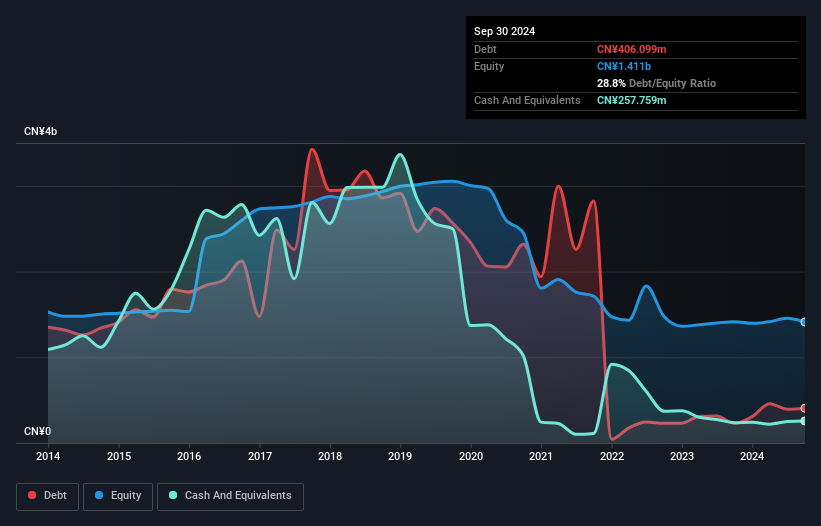Here's Why Henan Huaying Agricultural Development (SZSE:002321) Has A Meaningful Debt Burden

Warren Buffett famously said, 'Volatility is far from synonymous with risk.' So it seems the smart money knows that debt - which is usually involved in bankruptcies - is a very important factor, when you assess how risky a company is. Importantly, Henan Huaying Agricultural Development Co., Ltd. (SZSE:002321) does carry debt. But the real question is whether this debt is making the company risky.
When Is Debt Dangerous?
Debt assists a business until the business has trouble paying it off, either with new capital or with free cash flow. If things get really bad, the lenders can take control of the business. However, a more frequent (but still costly) occurrence is where a company must issue shares at bargain-basement prices, permanently diluting shareholders, just to shore up its balance sheet. Of course, debt can be an important tool in businesses, particularly capital heavy businesses. The first thing to do when considering how much debt a business uses is to look at its cash and debt together.
Check out our latest analysis for Henan Huaying Agricultural Development
How Much Debt Does Henan Huaying Agricultural Development Carry?
You can click the graphic below for the historical numbers, but it shows that as of September 2024 Henan Huaying Agricultural Development had CN¥406.1m of debt, an increase on CN¥230.0m, over one year. However, it does have CN¥257.8m in cash offsetting this, leading to net debt of about CN¥148.3m.

A Look At Henan Huaying Agricultural Development's Liabilities
Zooming in on the latest balance sheet data, we can see that Henan Huaying Agricultural Development had liabilities of CN¥1.40b due within 12 months and liabilities of CN¥1.11b due beyond that. On the other hand, it had cash of CN¥257.8m and CN¥840.1m worth of receivables due within a year. So its liabilities outweigh the sum of its cash and (near-term) receivables by CN¥1.41b.
Henan Huaying Agricultural Development has a market capitalization of CN¥5.03b, so it could very likely raise cash to ameliorate its balance sheet, if the need arose. But we definitely want to keep our eyes open to indications that its debt is bringing too much risk.
We use two main ratios to inform us about debt levels relative to earnings. The first is net debt divided by earnings before interest, tax, depreciation, and amortization (EBITDA), while the second is how many times its earnings before interest and tax (EBIT) covers its interest expense (or its interest cover, for short). Thus we consider debt relative to earnings both with and without depreciation and amortization expenses.
Henan Huaying Agricultural Development has a very low debt to EBITDA ratio of 0.46 so it is strange to see weak interest coverage, with last year's EBIT being only 2.5 times the interest expense. So while we're not necessarily alarmed we think that its debt is far from trivial. Unfortunately, Henan Huaying Agricultural Development's EBIT flopped 14% over the last four quarters. If that sort of decline is not arrested, then the managing its debt will be harder than selling broccoli flavoured ice-cream for a premium. There's no doubt that we learn most about debt from the balance sheet. But it is Henan Huaying Agricultural Development's earnings that will influence how the balance sheet holds up in the future. So when considering debt, it's definitely worth looking at the earnings trend. Click here for an interactive snapshot.
But our final consideration is also important, because a company cannot pay debt with paper profits; it needs cold hard cash. So we always check how much of that EBIT is translated into free cash flow. Over the last two years, Henan Huaying Agricultural Development reported free cash flow worth 2.1% of its EBIT, which is really quite low. For us, cash conversion that low sparks a little paranoia about is ability to extinguish debt.
Our View
To be frank both Henan Huaying Agricultural Development's EBIT growth rate and its track record of covering its interest expense with its EBIT make us rather uncomfortable with its debt levels. But at least it's pretty decent at managing its debt, based on its EBITDA,; that's encouraging. Looking at the balance sheet and taking into account all these factors, we do believe that debt is making Henan Huaying Agricultural Development stock a bit risky. Some people like that sort of risk, but we're mindful of the potential pitfalls, so we'd probably prefer it carry less debt. While Henan Huaying Agricultural Development didn't make a statutory profit in the last year, its positive EBIT suggests that profitability might not be far away. Click here to see if its earnings are heading in the right direction, over the medium term.
When all is said and done, sometimes its easier to focus on companies that don't even need debt. Readers can access a list of growth stocks with zero net debt 100% free, right now.
Valuation is complex, but we're here to simplify it.
Discover if Henan Huaying Agricultural Development might be undervalued or overvalued with our detailed analysis, featuring fair value estimates, potential risks, dividends, insider trades, and its financial condition.
Access Free AnalysisHave feedback on this article? Concerned about the content? Get in touch with us directly. Alternatively, email editorial-team (at) simplywallst.com.
This article by Simply Wall St is general in nature. We provide commentary based on historical data and analyst forecasts only using an unbiased methodology and our articles are not intended to be financial advice. It does not constitute a recommendation to buy or sell any stock, and does not take account of your objectives, or your financial situation. We aim to bring you long-term focused analysis driven by fundamental data. Note that our analysis may not factor in the latest price-sensitive company announcements or qualitative material. Simply Wall St has no position in any stocks mentioned.
About SZSE:002321
Henan Huaying Agricultural Development
Henan Huaying Agricultural Development Co., Ltd.
Flawless balance sheet and good value.
Market Insights
Community Narratives



